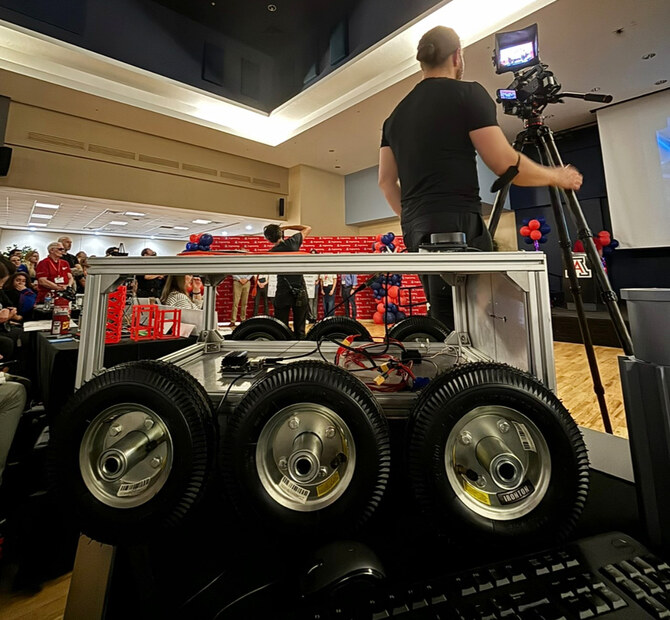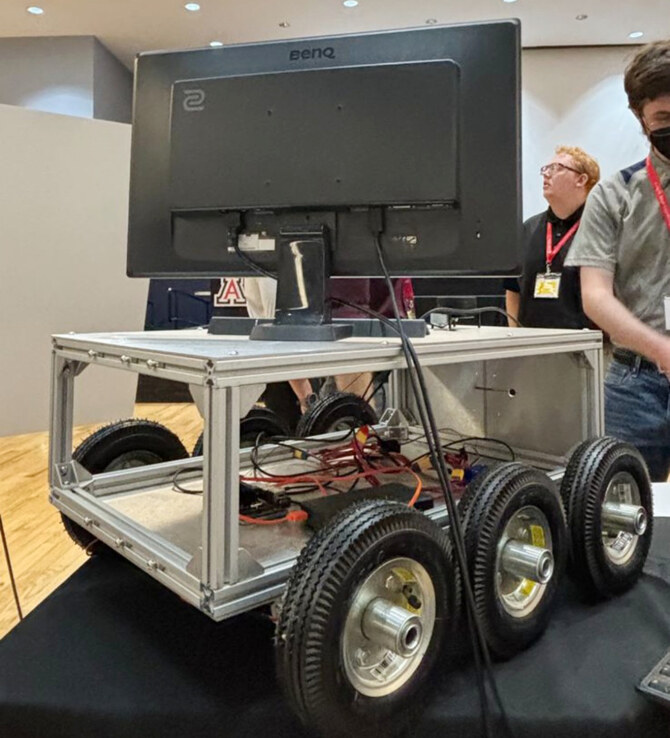RIYADH: While eager first-year college students were all looking down at their catalogs to select a major, Tala Al-Saedi was looking up at the stars.
A 2024 graduate of the University of Arizona where she majored in aerospace engineering, for her senior design project Al-Saedi was chosen by the dean of engineering to be part of a NASA-sponsored project, the Lunar South Pole Prospecting Rover.
When first deciding on a major, the only thing Al-Saedi knew was that she wanted it to be “unique and challenging.”

NASA’s Lunar South Pole Prospecting Rover was built by a team of six engineering students, including Saudi aerospace engineer Tala Al-Saedi. (Supplied)
Coming across aerospace engineering, she was captivated by the idea of “working on technology that operates in extreme environments.”
The Lunar South Pole Prospecting Rover, built by a team of six engineering students, “was designed to explore the lunar south pole and prospect resources such as water and ice, which could be crucial for sustaining a human presence on the moon.”
According to Al-Saedi, the project is well aligned with NASA’s Artemis Plan, which in 2026 is scheduled to land the first woman and first person of color on the moon.
I believe we’re entering a new era where possibilities for innovation and discovery are greater than ever before.
Tala Al-Saedi, Aerospace engineer
Al-Saedi told Arab News that “the rover needs to operate in the harsh conditions of the lunar south pole.”
As the thermal and structure subsystem lead, she was responsible for making sure the materials used will function in the conditions found at the pole.
“I had to make thermal management control systems, such as active and passive control systems, so it could save the rover’s instruments and keep it working during sunlight and at nighttime,” she said.
The lunar south pole does not receive very much sunlight and temperatures can be extremely low. The many craters on the surface of the pole, such as the Shackleton Crater, have illuminated rims but their interiors are in shadow.
Al-Saedi said that these conditions, coupled with high levels of radiation, make landing on the lunar south pole extremely difficult. Only one country has been able to do so successfully and that was India in August 2023 as part of their Chandrayaan-3 mission.
Al-Saedi also said that the craters in the region indicate the possibility of a water presence, which, in addition to entertaining the possibility of sustaining life on the moon, “could be used for future lunar missions and rocket fuel.”
The rover will continue to be developed by the next generations of senior engineering students at the University of Arizona which “ensures a future of students that can continue to refine the design and integrate new technologies and apply their own ideas,” Al-Saedi added.
“The project is a crucial step forward towards achieving long-term exploration goals that could eventually extend to Mars,” she said.
Al-Saedi held several extracurricular positions during her time at university that allowed her to step outside her comfort zone and explore the social culture of the school, as well as help ease other students’ transition and integration.
She was a member of the Society of Women Engineers and the Wildcat Fencing Club, and was also a global student ambassador, which meant she was international students’ first point of contact upon arriving in Tucson, Arizona. She said that being part of the Society of Women Engineers helped her to “stay focused and motivated,” inspiring her to encourage young engineering hopefuls to do the same.
“Being part of these organizations also aligned with my personal mission to advocate for greater female participation in STEM,” she said. It is a cause Al-Saedi is deeply passionate about and carries closely with her.
As a young Saudi woman, she expressed concern at the fact so few women engineers were choosing to major in aerospace engineering and cited the lack of female representation in the field as a leading factor in the creation of a vicious cycle.
She also spoke about the value of seeing yourself in your peers and how that helps push you forward in your academics and boosts confidence.
As far as Saudi space exploration goes, Al-Saedi is optimistic. “We’re just at the beginning,” she said, with missions such as Artemis and Vision 2030 underway, “I believe we’re entering a new era where possibilities for innovation and discovery are greater than ever before.”
Al-Saedi is encouraging all young Saudi students, women especially, to consider a future in STEM.
Moving forward in her postgraduate career, Al-Saedi is excited to turn the final frontier into her very own stomping ground. “I really want to contribute to the development of technology and make human exploration in space safer and more sustainable.”






























